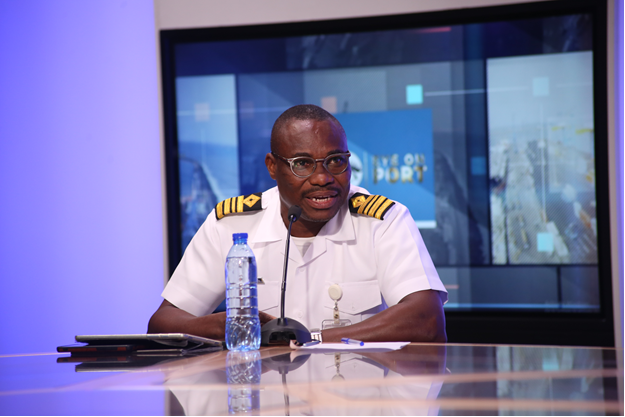Harbour Masters at Ghana’s ports have praised regional efforts that have led to the significant reduction in maritime crimes of the Gulf of Guinea.
Speaking on Eye on Port, in the aftermath of the 7th Meeting of the Ports Management Association of West and Central Africa (PMAWCA) and Harbour Masters Network in Ghana, the Harbour Masters expressed satisfaction at a much safer Gulf of Guinea compared to a few years earlier.
Capt. Daniel Quartey, Deputy Harbour Master in charge of Logistics at the Port of Tema, said reports from the International Maritime Bureau (IMB) indicate that the number of piracy and hijacking incidents within the region was forty (40) in the first quarter of 2021 compared to an impressive zero (0) for the same period this year. He applauded the navies in the region for their efforts.
“We need to congratulate our navies and men who go out there to risk their lives to ensure that there is sanity in our waters.”
Together with Capt. James Richmond Quayson, the Harbour Master at the Port of Takoradi, they attributed this success to the coordinated efforts by key players at both the regional and international levels.
They acknowledged the creation of the two regional maritime security centres, the West Africa Regional Maritime Security Centre (CRESMAO) and the Maritime Security Regional Coordination Centre for Central Africa (CRESMAC), for their efforts in information management and sharing, operational monitoring, crisis coordination, training and capacity building.
CRESMAO and CRESMAC, are sub bodies of the Interregional Coordination Center for the Implementation of Regional Strategy for Maritime Safety and Security in Central and West Africa (ICC).
Its creation came in the aftermath of the 2013 Yaoundé Summit of Heads of State on Maritime Safety and Security in the Gulf of Guinea.
Capt. Quartey also indicated that his outfit participated with key sub regional stakeholders in the Obangame Express, the largest maritime exercise in West Africa which helped sharpen skills in maritime security and safety enabling them to be well-equipped to combat all forms of insecurities in the region.
The Harbour Masters said the trickledown effect of reduced maritime crimes is very important as they impact on the cost of doing business in the region.
“They are doing a good job protecting our maritime domain. Because now you can rest assured that, when you commit an offence in Lomé waters for example, someone would be waiting to deal with you in Ghana waters. We pray this is sustained. When it is sustained, armed robbery at sea, illegal, unreported and unregulated fishing, illegal bunkering among others will be curtailed. When our region is well policed, ship owners will know the region is safe, then the insurance premium will go down and it will result in better lives for people,” Capt. Richmond Quayson elaborated.
The Secretary General of the Ports Management Association of West and Central Africa (PMAWCA), Jean Marie-Koffi, also touched on the contribution of the association to the strive for safer ports and waters during maritime trade.
He said the association has developed the strategy to ensure issues of security and safety “are discussed at length at the PMAWCA’s technical committee level and the Harbour Masters Network and we try to implement the recommendations that come out at the port level. We also foster certain international cooperation with ECOWAS, ECCAS, African Union, IMO and World Bank for example to address them.”










